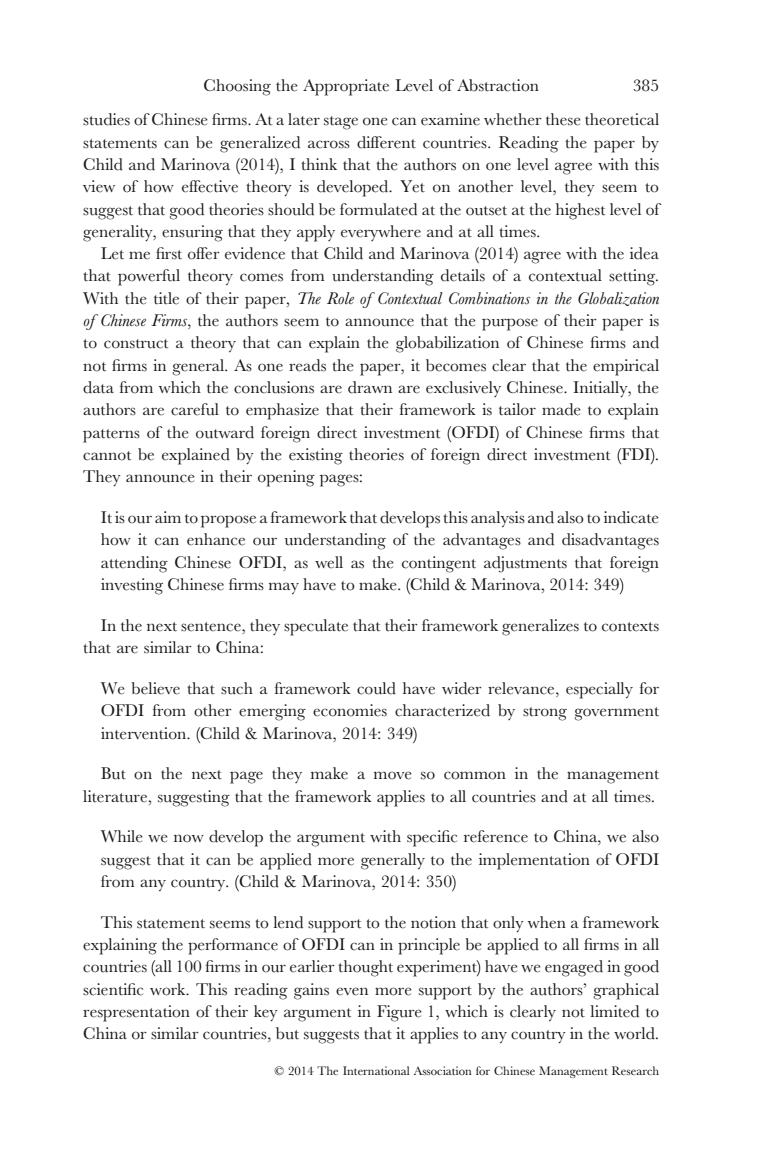正在加载图片...

Choosing the Appropriate Level of Abstraction 385 studies of Chinese firms.At a later stage one can examine whether these theoretical statements can be generalized across different countries.Reading the paper by Child and Marinova(2014),I think that the authors on one level agree with this view of how effective theory is developed.Yet on another level,they seem to suggest that good theories should be formulated at the outset at the highest level of generality,ensuring that they apply everywhere and at all times. Let me first offer evidence that Child and Marinova(2014)agree with the idea that powerful theory comes from understanding details of a contextual setting. With the title of their paper,The Role of Contextual Combinations in the Globalization of Chinese Firms,the authors seem to announce that the purpose of their paper is to construct a theory that can explain the globabilization of Chinese firms and not firms in general.As one reads the paper,it becomes clear that the empirical data from which the conclusions are drawn are exclusively Chinese.Initially,the authors are careful to emphasize that their framework is tailor made to explain patterns of the outward foreign direct investment(OFDI)of Chinese firms that cannot be explained by the existing theories of foreign direct investment(FDD). They announce in their opening pages: It is our aim to propose a framework that develops this analysis and also to indicate how it can enhance our understanding of the advantages and disadvantages attending Chinese OFDI,as well as the contingent adjustments that foreign investing Chinese firms may have to make.(Child Marinova,2014:349) In the next sentence,they speculate that their framework generalizes to contexts that are similar to China: We believe that such a framework could have wider relevance,especially for OFDI from other emerging economies characterized by strong government intervention.(Child Marinova,2014:349) But on the next page they make a move so common in the management literature,suggesting that the framework applies to all countries and at all times. While we now develop the argument with specific reference to China,we also suggest that it can be applied more generally to the implementation of OFDI from any country.(Child Marinova,2014:350) This statement seems to lend support to the notion that only when a framework explaining the performance of OFDI can in principle be applied to all firms in all countries(all 100 firms in our earlier thought experiment)have we engaged in good scientific work.This reading gains even more support by the authors'graphical respresentation of their key argument in Figure 1,which is clearly not limited to China or similar countries,but suggests that it applies to any country in the world. 2014 The International Association for Chinese Management Researchstudies of Chinese firms. At a later stage one can examine whether these theoretical statements can be generalized across different countries. Reading the paper by Child and Marinova (2014), I think that the authors on one level agree with this view of how effective theory is developed. Yet on another level, they seem to suggest that good theories should be formulated at the outset at the highest level of generality, ensuring that they apply everywhere and at all times. Let me first offer evidence that Child and Marinova (2014) agree with the idea that powerful theory comes from understanding details of a contextual setting. With the title of their paper, The Role of Contextual Combinations in the Globalization of Chinese Firms, the authors seem to announce that the purpose of their paper is to construct a theory that can explain the globabilization of Chinese firms and not firms in general. As one reads the paper, it becomes clear that the empirical data from which the conclusions are drawn are exclusively Chinese. Initially, the authors are careful to emphasize that their framework is tailor made to explain patterns of the outward foreign direct investment (OFDI) of Chinese firms that cannot be explained by the existing theories of foreign direct investment (FDI). They announce in their opening pages: It is our aim to propose a framework that develops this analysis and also to indicate how it can enhance our understanding of the advantages and disadvantages attending Chinese OFDI, as well as the contingent adjustments that foreign investing Chinese firms may have to make. (Child & Marinova, 2014: 349) In the next sentence, they speculate that their framework generalizes to contexts that are similar to China: We believe that such a framework could have wider relevance, especially for OFDI from other emerging economies characterized by strong government intervention. (Child & Marinova, 2014: 349) But on the next page they make a move so common in the management literature, suggesting that the framework applies to all countries and at all times. While we now develop the argument with specific reference to China, we also suggest that it can be applied more generally to the implementation of OFDI from any country. (Child & Marinova, 2014: 350) This statement seems to lend support to the notion that only when a framework explaining the performance of OFDI can in principle be applied to all firms in all countries (all 100 firms in our earlier thought experiment) have we engaged in good scientific work. This reading gains even more support by the authors’ graphical respresentation of their key argument in Figure 1, which is clearly not limited to China or similar countries, but suggests that it applies to any country in the world. Choosing the Appropriate Level of Abstraction 385 © 2014 The International Association for Chinese Management Research